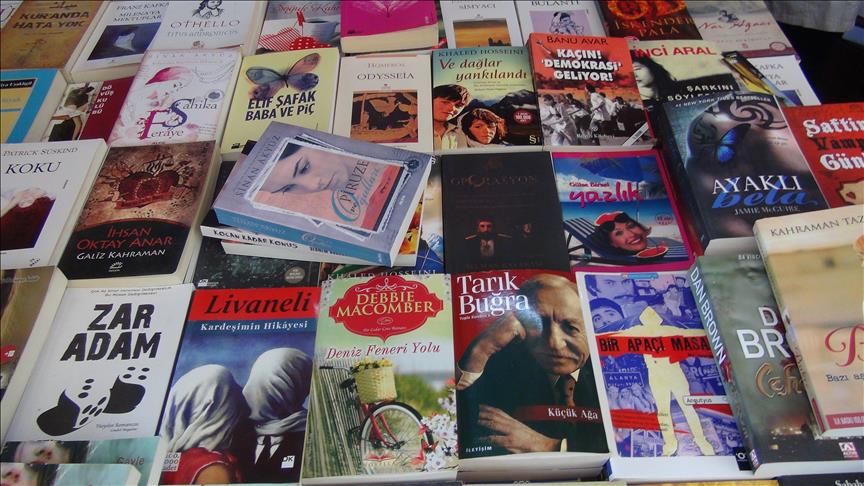
By Furkan Naci Top
ISTANBUL
"I don't think this is a crime," says 15-year-old Kerem standing in front of his clutch of illegally-printed books. "I am earning my keep," he adds.
This small peddler, working openly at one of Istanbul’s major transport hubs, is a huge problem for Turkey's publishing sector, which is now demanding the authorities crack down on illegal booksellers.
As Turks hunt for books to take on holiday this summer, a study conducted in May by the country’s Publishers’ Federation has revealed that nearly 20 percent of readers buy illegally published books and almost 30 percent know someone who does.
These ‘black books’ are not hard to come by. People in Turkey, especially in major cities, can encounter peddlers like Kerem on pavements, busy avenues or overpasses in rush hours. Pirated paperbacks have even spread into book stores, according to publishing houses.
Turkish readers’ eyes are being drawn by low prices; illegally copied books are sold for 8-10 liras (US$4), a major saving on an average retail price of 20-30 liras.
A majority, ninety percent, of Turkish readers complained books are too expensive, the study claims.
Perhaps unsurprisingly, publishers do not agree.
Yunus Sonmez, general manager of major publishing house, Pegasus – seller of the Turkish version of worldwide bestseller ‘Fifty Shades of Grey’ (a particular favorite for the book pirates) – says prices are reasonable, considering cheap deals available in wholesale markets or discounts in online sales.
"Every book store offers sales," Sonmez tells Anadolu Agency. "Books are sold for US$4-5. You can enjoy 25-30% discounts in online shopping."
Sonmez points the finger at “light” sentences and punitive measures for illegal publishing, calling for increased punishment for counterfeiters – and for those who sell the books.
In Turkey, someone selling an illegal and unlabeled book can be hit with a fine of between 5,000 liras (US$2,400) and 50,000 liras and/or jail time ranging from three months to two years.
For people producing these copies with fake anti-counterfeiting stickers, the sentences go up to a jail term from three to six years and a fine between 50,000 liras (US$24,000) to 250,000 liras.
In the first six months of 2013, the police raided 78 places in various cities in Turkey, capturing more than 220,000 pirated books, according to the Publishers’ Federation.
Now publishers want more action. "The taxi drivers made it through and met with the Prime Minister Recep Tayyip Erdogan where, I believe, they found solutions for their problems. But we could not achieve this. I don't remember a day that this happened," says Sonmez.
Another problem that publishers suffer from, besides the minor fines for copyright breaches, comes from so-called tolerant judges. According to lawyer Elif Kurtulus, who worked with a publishers’ union for nearly three years, many judges see this phenomenon as a victimless crime.
"The judges have an easy-going mentality like 'let the people read'," Kurtulus told AA. Kurtulus said another solution could be in training expert prosecutors. "Some prosecutors do not recognize a fake," she says.
Many people will open their books on their sunbeds, but according to Sonmez, 85% of these will be illegal. Kurtulus says a busy summer awaits her as she follows thousands of denouncements for catching lawbreakers.
Sonmez also claimed that illegally published books sell several times more than the original copies, creating tax evasion and damaging the Turkish economy by an estimated 200 million liras (US$94 million).
According to International Publishers Associations’ data, Turkey's publishing market had a value of nearly US$1.7 billion in 2012, making it one of the biggest in the world.
At the other end of the pirated books chain, Kerem earns 150 liras (US$71) a day.
When asked if he ever gets a negative reaction while selling, he says no. “Except when the police arrive,” he swiftly adds. “I just pack it all up and run.”
Anadolu Agency website contains only a portion of the news stories offered to subscribers in the AA News Broadcasting System (HAS), and in summarized form. Please contact us for subscription options.

